By Martha Cecilia Ovadia, Senior Program Associate, Equity & Communications
In advance of TFN’s 2oth Anniversary Conference: Power Forward in Miami, we’ll be sharing interesting and insightful resources that provide context for many of the issues we’ll explore as part of our annual conference, which takes place March 18-20, 2019.
Don’t forget to catch our #MiamiSpotlight and #TFNMiami news on our twitter (Funders_Network) and facebook (Funders’ Network for Smart Growth and Livable Communities) feeds, and check out our TFN 20th Anniversary: Power Forward annual conference page for updates on speakers and sessions.
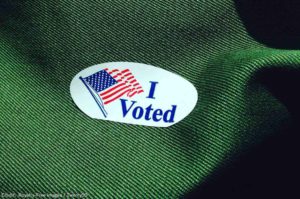 Amid pervasive voter suppression, the big winner on the 2018 ballot was voting itself (ACLU Florida | November 9, 2018)
Amid pervasive voter suppression, the big winner on the 2018 ballot was voting itself (ACLU Florida | November 9, 2018)
Voter suppression took center stage during the 2018 midterm election cycle, with states across the country failing to make voting easily accessible for everyone eligible to cast a ballot or — worse — actively making it hard.
In Georgia’s heated gubernatorial race, for example, hundreds of voters who cast absentee ballots were nearly disenfranchised due to dubious judgments made by state officials that signatures on the ballots didn’t match those on file. For the first time, North Dakota ran an election with a voter ID law that made it difficult for many Native Americans to vote, and in Kansas, polling stations used by voters of color were moved to distant, hard-to-reach locations. Partisan gerrymandering and the assault on voting rights continue to present a generational threat to American democracy. Read more here.
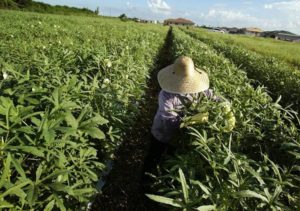
Florida heat is already hard on outdoor workers. Climate change will raise health risks (Alex Harris | Miami Herald | November 1, 2018)
Harvesting crops or building a house in the Florida sun is grueling work, and a new report shows that it’ll only get more miserable and unsafe for workers as climate change sends temperatures soaring.
By at least one safety standard, it was too hot for Floridians to do very heavy labor (like digging with a shovel) for at least an hour a day almost every single day this summer.
Unworkable, a report from Public Citizen and the Farmworker Association of Florida released Tuesday, spells out the risks to the state’s large population of outdoor workers, particularly construction and agricultural workers. Read more here.
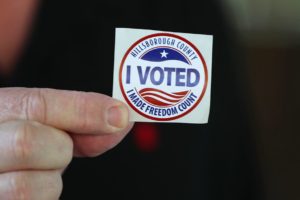 Florida votes to restore ex-felon voting rights with Amendment 4 (German Lopez| Vox | November 6, 2018)
Florida votes to restore ex-felon voting rights with Amendment 4 (German Lopez| Vox | November 6, 2018)
Florida voters during Tuesday’s midterm elections approved Amendment 4, automatically restoring voting rights in the state for people previously convicted of felonies.
Florida’s Amendment 4 restores voting rights for people in the state convicted of felonies as long as they have completed their sentences, although anyone convicted of murder or felony sex offenses would be excluded.
Based on the Sentencing Project’s 2016 estimates, this benefits more than a million people. The organization estimated in 2016 that nearly 1.5 million people in Florida have completed felony sentences but can’t vote — about 9.2 percent of the voting-age population in Florida. The total, though, includes some people convicted of murder and felony sex offenses, so not every one of those people benefits under Amendment 4. Read more here.
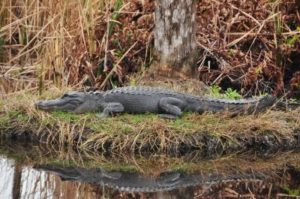 South Florida cities green-light bonds for green spaces (Sammy Mack | WLRN| November 6, 2018)
South Florida cities green-light bonds for green spaces (Sammy Mack | WLRN| November 6, 2018)
South Florida’s green spaces got some serious green from voters Tuesday.
A half dozen municipalities across South Florida asked voters to weigh in on bond items that would help pay for parks and recreation initiatives. The projects involved everything from improving lighting and walkways to creating entirely new parks Read more here.
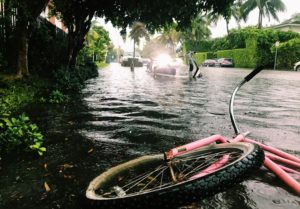 Climate resiliency can save South Florida’s future, but only if communities take action (Travis Cohen | Miami New Times | October 25, 2018)
Climate resiliency can save South Florida’s future, but only if communities take action (Travis Cohen | Miami New Times | October 25, 2018)
Few issues facing the Florida peninsula are more pressing than climate change. Sea-level rise, saltwater intrusion, and rising temperatures all pose serious threats to the Sunshine State, and all of them are directly linked to our shifting climate. In 2015, during a speech given on Earth Day in the Everglades, President Barack Obama praised Miami-Dade, Broward, Palm Beach, and Monroe Counties for uniting to take on climate change.
“Five years ago, local leaders down here, Republicans and Democrats, formed the bipartisan Southeast Florida Regional Climate Change Compact — an agreement to work together to fight climate change,” Obama said. “And it’s become a model not just for the country, but for the world.” Read more here.
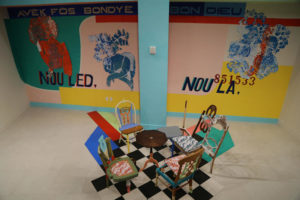 Miami artist Nadia Wolff explores Haitian identity and class in new work (Nadege Green | WLRN | September 14, 2018)
Miami artist Nadia Wolff explores Haitian identity and class in new work (Nadege Green | WLRN | September 14, 2018)
The BayParc Apartments in downtown Miami opened a space to artists through a collaboration with the national nonprofit YoungArts.
The latest installation there is “A Place To Be Held” by Miami-native and 2016 YoungArts winner Nadia Wolff. She is currently studying textile art at the Rhode Island School of Design and African Studies at Brown University.
Wolff’s work is the first in a series of art projects by YoungArts alumni that will be showcased at BayParc, 1756 N Bayshore Dr. Read more here.
About the Author
 Martha Cecilia Ovadia is TFN’s senior program associate for equity and communications. Contact her at marci@www.fundersnetwork.org.
Martha Cecilia Ovadia is TFN’s senior program associate for equity and communications. Contact her at marci@www.fundersnetwork.org.
